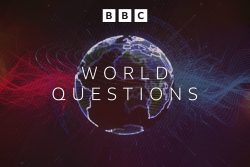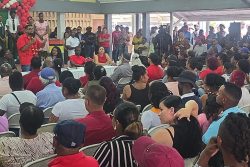US Secretary of State Marco Rubio breezed in to Guyana last week on a brief visit before breezing out again to Suriname. His main message would have afforded considerable reassurance to the officials in Shiv Chanderpaul Drive, representing as it did a clear warning to Venezuela. “It would be a very bad day for the Venezuelan regime,” he said, “if they were to attack Guyana or attack ExxonMobil … it would be a very bad day, a very bad week for them, and it would not end well for them.”
When asked by this newspaper if the US would stand by Guyana in military terms and what its response would be if ExxonMobil came under attack, he replied that he would not get into details. However, he subsequently went on to say, “[W]e have a big navy, and it can get almost anywhere, it can get anywhere in the world, and we have commitments that exist today with Guyana.” The day prior to Mr Rubio’s arrival it had been announced that the GDF was participating in a joint exercise with a vessel from the US Navy in Guyana’s EEZ.
Curious members of the public would probably have liked to know whether America’s clear intention to protect marine oil installations extended to a situation where a land incursion occurred. All that can be inferred from the Secretary of State’s remarks coupled with what President Trump has had to say in the past about not committing US troops anywhere is that there would be no US boots on the ground here. Washington would certainly give assistance in other ways, and would put pressure on Caracas, although it is difficult to see how substantially more sanctions can be imposed than currently exist; Venezuela is already in dire economic straits.
The regime to our west insisted very noisily that it would not be intimidated by Mr Rubio, whom it insulted in its characteristic denigratory style. The incongruously named Minister for the Interior, Justice and Peace Diosdado Cabello said the US had no right to get involved in what he called the issue of ‘Guyana Esequiba’, which was and had been Venezuelan territory for 200 years. At a later stage he went on to say that “territorial waters are generated by the possession of the territory,” although he insisted that his country had no intention of attacking anyone.
Defence Minister Padrino López said nothing would divert Venezuela from defending its territorial integrity, warning that “interference by foreign powers could escalate dangerously.” As for President Maduro, aside from an abusive reference, he was quoted as saying, “No one threatens Venezuela because this is the homeland of the liberators, this is the homeland of Bolívar.”
Of course public bluster is no indication of intent, and it is difficult to say whether what Mr Rubio had to say gave Miraflores pause for thought about adventurism on land. At least his words would have dissuaded Caracas from maritime recklessness of the Teknik Perdana variety of twelve years ago, but could we be certain that if our neighbour were economically desperate enough and considered it had nothing to lose it would not cross the Cuyuni?
But the Secretary of State did not come here just to talk about security from Venezuela, he had another form of security in mind too. This was addressing what were called “shared security challenges” including narco-trafficking, human trafficking, money laundering and smuggling in its various forms. The partnership in combatting transnational crime and information sharing was expressed in an MOU signed on Thursday.
It could not have escaped Washington’s attention that there have been two major interdictions of ships originating from Guyana carrying narcotics this year, one off Trinidad and the other off West Africa. Then there was the massive cocaine bust in Matthews Ridge last year said to have been the largest in this country’s history. It cannot have given the Americans confidence that there have been no major arrests following these discoveries, suggesting as it does some level of corruption in local enforcement agencies and/or officialdom.
We reported that this newspaper understands Guyana will pay to have a defence foreign-liaison officer stationed at a subordinate command of the US Southern Command in Florida. Here, among various other activities, counter illicit trafficking operations are conducted.
But the Secretary of State had other things on his mind too, and one of them was the influence of China, which the present Washington administration regards as a major issue. It came up during the visit in an indirect way in so far as Mr Rubio acknowledged that not just Guyana but other Caricom countries had raised concerns about the US imposition of steep fees on Chinese vessels which would have serious economic repercussions for them. He was not unsympathetic to their plight, but he did explain that the State Department was not in charge of trade policy, although he would take the complaint back and raise it as an issue which would have a detrimental effect on economic development.
The Chinese were hardly impressed by what had been said about them, and in a Facebook Post pointed out, among other things, that “China has participated fully in the biggest economic and social transformation in the history of Guyana. Facts and figures speak louder than anything else.”
But it was in Suriname that more direct comments were made with the Secretary of State criticising the quality of Chinese projects and what he considered their unfair practices. The example of poor quality Chinese work that he gave was the East Bank road to the airport in Guyana, which he said “was so bad that almost all of us suffered a concussion during the ride.” If that had been America, he said, someone would have sued. Unfortunately, Heroes Highway, as it is called, was built not by the Chinese, but by Guyanese contractors.
As it was the Chinese Embassy in Paramaribo issued a frosty response quoted by Starniews: “As for who is really practising coercive diplomacy and resource exploitation in Latin America, the facts are clear to all,” it ran. “We urge the United States to seriously consider its own hegemonic acts, harassment and exploitative looting against developing countries in Latin America and the Caribbean, and to immediately stop its malicious distortions and smear campaigns against China.”
What does not appear to have come up here significantly, but is important to this country, was the Cuban medical missions. It was raised on Mr Rubio’s visit to Jamaica a few days ago, where he did not seem to show any real disposition to modify his stance in opposition to them.








